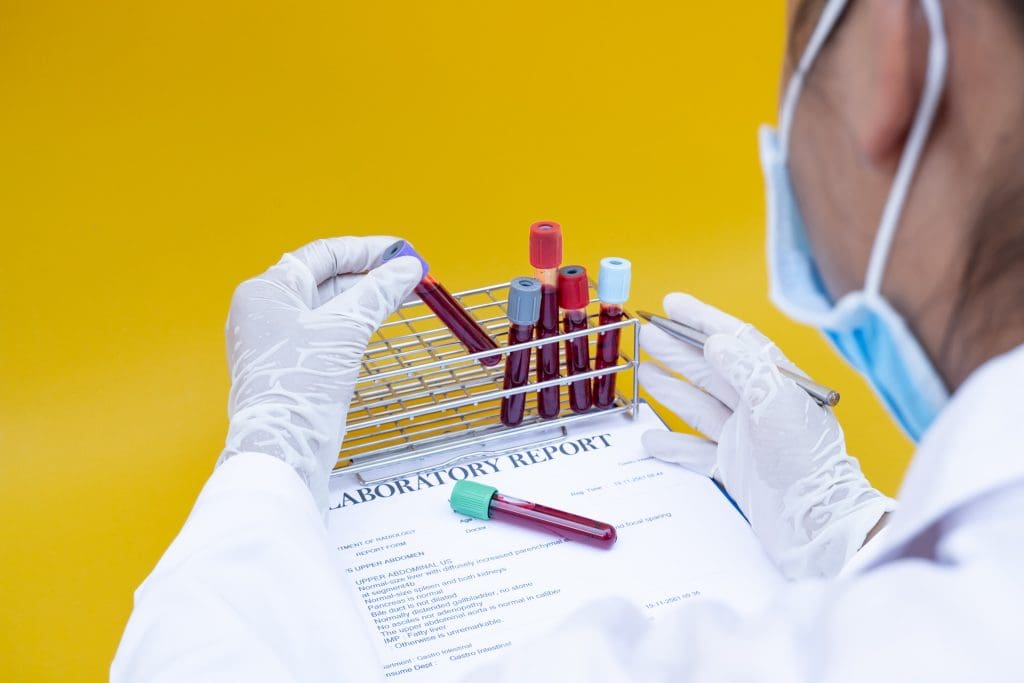Last Updated on October 21, 2025 by mcelik
Myelodysplastic syndromes (MDS) are a group of disorders. They are caused by poorly formed or dysfunctional blood cells. The Aplastic Anemia & MDS International Foundation says MDS affects about 4 out of every 100,000 people in the United States.
Finding the right mds medical center is key for effective treatment. There are many treatment options. Knowing what is mds in healthcare helps patients make informed decisions about their care.
It’s important for patients to understand myelodysplastic syndrome (MDS) to find the right treatment. MDS is a group of disorders where blood cells don’t form right, leading to bone marrow failure.

Myelodysplastic syndromes cause blood cells to not work right. This can lead to anemia, infections, and bleeding problems. MDS affects patients’ health and mood.
The disease can get worse, turning into acute myeloid leukemia (AML). Getting the right treatment quickly is key. Patients with MDS need care from myelodysplastic syndrome specialists who can create a treatment plan just for them.

Getting specialized treatment for MDS is vital because of its complexity. A mds doctor with experience can give the best care. They consider the patient’s specific situation and needs.
Getting treatment at centers of excellence healthcare gives patients access to new treatments and clinical trials. A team of experts works together to improve patient outcomes and quality of life.
In summary, knowing about MDS and its treatment is key for patients to make good choices about their care. Getting help from experienced doctors at top centers can greatly help manage the condition.
Understanding MDS is key to finding the right treatment. This involves looking at the disease type, risk level, and the patient’s health.
Treating MDS is complex. It needs a detailed plan that looks at many important factors. Disease classification is a big part of this. It helps doctors know the exact type of MDS and how it might progress.

MDS is divided into subtypes based on bone marrow blasts, genetic changes, and blood counts. Risk stratification is also vital. It predicts how the disease might grow and the patient’s survival chances.
The International Prognostic Scoring System (IPSS) is a key tool for this. It looks at bone marrow blasts, genetic makeup, and blood counts to rank a patient’s risk.
Other than disease type and risk, patient-specific factors are also important. These include the patient’s age, health, and any other health issues.
For example, older patients might need gentler treatments because of health problems. Younger patients might be better candidates for more aggressive treatments, like stem cell transplants.
By carefully weighing these factors, doctors can create a treatment plan that meets each patient’s unique needs.
Finding the right treatment center is key for MDS patients. They need specialized expertise and the latest treatments. There are several important factors to look at.
First, look at the center’s expertise and experience in MDS. Centers with a dedicated MDS program are best. They have hematologists and oncologists who know MDS well.
These doctors keep up with new treatments. They understand MDS’s complexities.
Another key factor is clinical trials and research. Top MDS centers join clinical trials. This gives patients new treatments not found elsewhere.
It also helps improve treatment for everyone. Ask about clinical trials and research at the center. This shows their commitment to MDS care.
A multidisciplinary approach to care is vital. The best centers have a team of specialists. They work together to create a treatment plan for each patient.
This team includes hematologists, oncologists, and more. They consider all aspects of care. This ensures a well-rounded treatment plan.
By looking at these factors, MDS patients can find top-notch care. They can choose centers that are truly centers of excellence healthcare for MDS.
Choosing a top-rated cancer center for Myelodysplastic Syndrome (MDS) treatment is key. These centers are known for their excellence in cancer care, including MDS. They offer a team approach to patient care.
Memorial Sloan Kettering Cancer Center is a top choice for MDS treatment. Their hematology service focuses on high-quality care. They use innovative treatments and put patients first.
“At Memorial Sloan Kettering, our goal is to provide the most effective treatment options for MDS patients, tailored to their individual needs.” –
Memorial Sloan Kettering Cancer Center
Memorial Sloan Kettering’s Approach to MDS:
| Program Aspect | Description |
| Expertise | World-class hematologists and oncologists |
| Research | Active participation in clinical trials for MDS |
| Support | Comprehensive support services for patients and families |
Dana-Farber Cancer Institute leads in cancer research and treatment, including MDS. Their hematologic malignancy program offers various treatments. This includes standard therapies and new clinical trials.
Dana-Farber’s MDS Treatment Highlights:
For those with MDS, top U.S. centers offer advanced treatments. These places are known for their quality care and new treatments. They also have a team approach to managing MDS.
This approach brings together experts from many fields.
State-of-the-art facilities: The Cleveland Clinic has the latest technology. This helps them make accurate diagnoses and treat MDS effectively.
Johns Hopkins Sidney Kimmel is a leading cancer center for MDS patients. Their team focuses on personalized, caring treatment. They also offer many support services.
Research and clinical trials: The center is into research and offers clinical trials. This lets patients try new treatments.
These top centers lead in MDS treatment, aiming for the best results. Choosing one of these places means getting top-notch, specialized care.
Bone marrow transplants are key in treating MDS. Some hospitals excel in this area, thanks to their skilled teams and top-notch care. The success of the transplant depends on the team’s experience and the quality of care.
Fred Hutchinson Cancer Research Center is known for its cutting-edge cancer treatments. Their bone marrow transplant program for MDS patients is highly successful. They offer full care, from before the transplant to after.
“The Fred Hutchinson Cancer Research Center has been at the forefront of bone marrow transplantation for decades, giving hope to patients with MDS and other blood cancers.”
City of Hope National Medical Center is a top choice for bone marrow transplants in MDS treatment. Their program is known for its team approach. Experts in hematology, oncology, and bone marrow transplantation work together to tailor care for each patient.
Their care includes:
Stanford Health Care is known for its innovative treatments and clinical trials in hematology and oncology. Their bone marrow transplant program for MDS patients is highly specialized. They offer a range of treatments tailored to each patient’s needs.
| Hospital | Transplant Success Rate | Specialized Care Features |
| Fred Hutchinson Cancer Research Center | High | Comprehensive pre- and post-transplant care |
| City of Hope National Medical Center | High | Multidisciplinary team approach |
| Stanford Health Care | High | Innovative treatments and clinical trials |
When looking into a bone marrow transplant for MDS, it’s important to check the hospitals’ expertise and care. These top hospitals offer unique strengths and specialized care options. These can greatly improve patient outcomes.
Across America, there are special centers for Myelodysplastic Syndrome (MDS) patients.
These places have the latest technology and teams of experts in MDS care.
The Northeast has many top MDS treatment centers.
The Midwest has several top MDS treatment centers.
The South has many important MDS treatment centers.
The West has centers that focus on MDS treatment.
These centers offer MDS patients special care, new treatments, and chances to join clinical trials. This helps improve their health and life quality.
For patients with MDS, finding the right specialist is key. These experts can greatly improve treatment results.
Many top MDS specialists have made big strides in treatment. They’ve helped create new options and better care for patients. Let’s explore some of these experts and their methods.
Mark Kropf MD is known for his MDS treatment work. He focuses on personalized care. He tailors each treatment plan to fit the patient’s needs.
Dr. Kropf believes, “Knowing each patient’s MDS is key to good treatment.”
“The key to successful MDS treatment lies in understanding the complex biology of the disease and applying that knowledge to create personalized treatment plans.” – Mark Kropf MD
Carl Atallah MD has greatly helped MDS care, focusing on clinical trials and research. His work has led to new treatments and a better understanding of MDS.
Dr. Atallah’s team is leading in MDS research. They offer patients new, advanced treatments. He says, “Clinical trials give patients new therapies and help us learn more about MDS.”
Ishmael Jaiyesimi DO is a respected MDS specialist. He’s known for his comprehensive approach to patient care. Dr. Jaiyesimi stresses the importance of a team approach in MDS care.
Other specialists are also making big impacts in MDS treatment. Joseph Savona MD and Michael Buckstein MD are known for their MDS research and treatment. Their work is helping to advance the field and improve patient care.
These specialists, along with others, are leading in MDS care. They offer patients new treatments and caring support.
MDS is a complex disease that needs specialized care. Academic medical centers lead in research and treatment. They offer the newest therapies and clinical trials to patients.
The OSU Comprehensive Transplant Center is a top example. It combines the latest research with clinical care. This gives MDS patients the best care possible.
Key Features of Academic Medical Centers like OSU:
Experts like James Leipzig MD are key in MDS treatment. They work in university centers, advancing care through research and practice.
The collaboration between clinicians and researchers in these settings is vital. It turns scientific discoveries into real treatments.
Academic research drives MDS treatment forward. It provides the proof needed for new therapies and protocols.
In conclusion, academic medical centers are essential in fighting MDS. They offer patients the best care with innovative treatments and trials.
The treatment for Myelodysplastic Syndrome (MDS) is changing fast. New methods are making care better for patients. We now understand MDS better, leading to better treatments.
New MDS treatments are made for each patient. They include:
These treatments are updated often. They come from new research, giving patients the best care.
New therapies and trials are key to better MDS treatment. Some exciting areas include:
| Therapy | Description | Potential Benefit |
| Checkpoint inhibitors | Drugs that release the brakes on the immune system | Enhanced anti-tumor response |
| Targeted therapies | Drugs that target specific genetic mutations | Improved efficacy with reduced side effects |
| CAR-T cell therapy | A form of immunotherapy that uses genetically modified T cells | Potential for deep and durable responses |
Personalized medicine is key in MDS treatment. It uses a patient’s genetic profile to tailor treatment. This may include:
This approach helps healthcare providers give patients the best care. It improves outcomes and quality of life.
Finding the right MDS treatment center is a big task. It involves many things that are specific to each patient. Patients need to think about several factors to make a good choice.
How close the treatment center is to home matters a lot. Being near home makes it easier to get to for treatment and check-ups. Patients should think about:
Looking online for “centers of excellence near me” can help find top MDS treatment centers close by.
It’s important to know about insurance when picking a treatment center. Patients should:
Financial considerations go beyond insurance. They include lost income during treatment and costs for travel and staying away from home.
The kind of support services a treatment center offers is very important. When looking at MDS treatment centers, patients should think about:
Support services are key to helping MDS patients in many ways. They improve life during and after treatment.
Telemedicine is changing how MDS treatment works. It lets patients see top specialists online. This is great for those who can’t travel or live far from centers.
Telemedicine offers virtual second opinions from MDS experts. This is helpful for patients unsure about their diagnosis or treatment. They can get expert advice without leaving home.
Patients can get these opinions through many telemedicine platforms. These platforms connect patients with a wide range of specialists. This means patients get the latest and best advice without traveling.
Telemedicine helps care coordination between local doctors and MDS centers. This teamwork ensures patients get care that fits their needs. Local doctors can work with specialists to create treatment plans, even if the patient isn’t there.
This teamwork is key for MDS patients. It leads to better care by sharing information and discussing treatment options. This way, doctors can keep track of patient progress better.
Telemedicine has many benefits for MDS patients. It increases access to care, reduces travel needs, and lets patients get care at home. But, there are some downsides like technical problems and needing reliable internet.
Despite these challenges, telemedicine is a good choice for many. As technology gets better, telemedicine will likely become even more important. It will offer patients more flexibility and quality care.
Choosing the right treatment for Myelodysplastic Syndrome (MDS) is key to managing the disease well. It’s important for patients to get care from top experts at well-known centers.
They offer the latest treatments, chances to join clinical trials, and a team approach to care.
When picking a treatment center, think about how easy it is to get there, your insurance, and the support services they offer. Telemedicine can also help with getting second opinions and working with local doctors and specialists.
Knowing the value of specialized care and new treatments helps MDS patients make smart choices. This leads to better health and quality of life.
Myelodysplastic syndrome (MDS) is a group of disorders. It happens when blood cells don’t form right. Treatment varies based on the disease type and patient needs. It might include supportive care, immunotherapy, or bone marrow transplant.
Mark Kropf MD, Carl Atallah MD, Ishmael Jaiyesimi DO, Joseph Savona MD, and Michael Buckstein MD are well-known. They work at various top US institutions.
Centers like the OSU Transplant Center are key in MDS treatment. They offer new therapies, clinical trials, and team care.
New treatments and therapies are being tested in clinical trials. These include the latest protocols and personalized medicine.
Consider location, insurance, and support services. Also, look at the center’s MDS experience and expertise.
Yes, telemedicine options are available for MDS patients. They include virtual second opinions and care coordination.
Centers like Mayo Clinic and Cleveland Clinic offer specialized care. They also have access to clinical trials and a team approach to treatment.
The exact number of MDS specialists in the US is not known. But, many are affiliated with top cancer centers and academic medical centers.
Top hospitals for bone marrow transplant include Fred Hutchinson Cancer Research Center, City of Hope National Medical Center, and Stanford Health Care.
Yes, there are centers across America. They include the Northeast, Midwest, South, and West, like the Bruno Cancer Center Birmingham.
Subscribe to our e-newsletter to stay informed about the latest innovations in the world of health and exclusive offers!